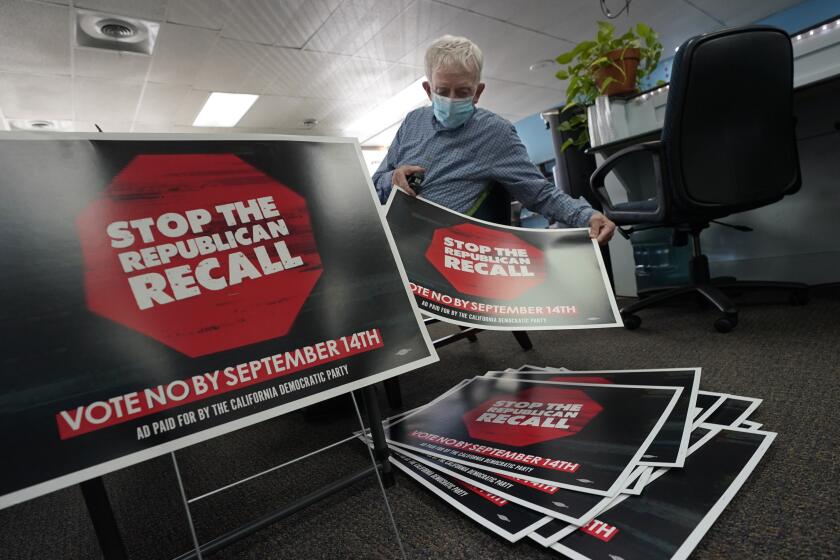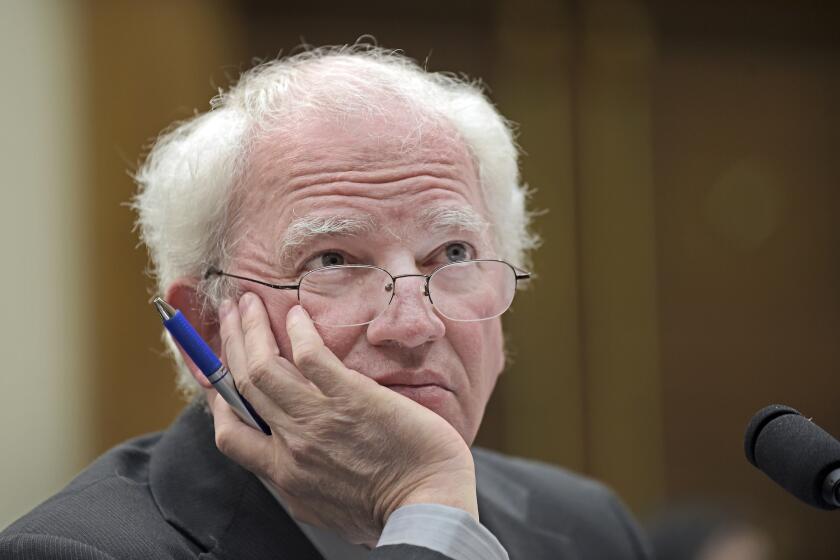Editorial: It’s not OK for special interests to use the California ballot to attack each other

- Share via
How has California’s direct democracy system been misused to serve narrow special interests? In just the last few years, there was the billionaire venture capitalist with the harebrained idea that California should be six — no, three separate states. There was the labor union that spent millions of dollars on ballot measures — in three elections! — to punish the dialysis industry that wouldn’t fall in line.
There was the referendum by the plastic-making industry that tried to undo California’s ban on single-use plastic shopping bags. There was the politically motivated recall election of Gov. Gavin Newsom in 2021 that failed. And more recently Big Oil poured money into qualifying a measure for the November ballot to repeal a law banning oil drilling near schools and homes. These are just a few high-profile examples.
There are also dozens of failed attempts by those without the deep pockets or political organizational skills to gather enough signatures to qualify their idea (or obsession in some cases. Looking at you, ferret legalization guy) for the ballot.
This was never the intention of former Gov. Hiram Johnson, who in the early 20th century pushed for a system allowing California voters to bypass elected officials to make or repeal laws, should lawmakers become beholden to special interests. Instead, the special interests themselves — rich individuals, industries, lobbying groups and labor unions, among others — learned they could use this citizen democracy tool as well, with the right investment.
The latest attempt to recall Gov. Gavin Newsom is a reminder a governor could be recalled and replaced by someone with far less voter support.
While voters have mostly seen through self-serving ballot initiatives, the misuse of the ballot continues and recently reached a new high — or rather, new low.
Last month, the California Apartment Assn. turned in more than enough signatures needed to place a measure on the November ballot for which the sole purpose appears to be stopping one guy from putting his own measures on future ballots. This one guy is Michael Weinstein, president of the Hollywood-based AIDS Healthcare Foundation, who has used his organization’s resources to fund three rent control initiatives (two failed, the third will be on November’s ballot).
Weinstein says that this is clearly a measure intended to stop his efforts to expand rent control. And there are several reasons that support that assertion. The association’s members include apartment owners, managers and investors who are typically opposed to rent control for obvious reasons. The campaign site protectcapatientsnow.com is subtitled “Stop the Weinstein Scam.” The campaign video on the site features Weinstein as well, calling him a “predatory pharmaceutical middleman” and “slumlord.” (The AIDS charity has a problematic history as a landlord of Skid Row housing for homeless people.)
Legal scholar John Eastman earned his disbarment by the State Bar of California by pushing legal theories that went well beyond the very wide latitude given lawyers for their zealous advocacy.
And, its name not withstanding, the Protect Patients Now Act’s language seems tailored specifically to target the AIDS Healthcare Foundation. It applies only to healthcare providers that have spent more than $100 million in the last decade on anything not considered direct patient care and that operate multifamily housing with more than 500 high-severity health and safety violations. The AIDS Healthcare Foundation meets all of those criteria. Under the proposal, it would lose its tax-exempt status if it spends more than 2% of its revenue from 340B, a federal drug discount program, on anything other than healthcare.
Incredibly, the proponents insist that the measure is only about stopping abuse of the 340B program, which mandates that nonprofit healthcare providers serving low-income patients get discounts from pharmaceutical companies but are reimbursed for the full price of those drugs by public programs. The healthcare providers are allowed to use the difference to pay for other health services for their patients. Weinstein says that lack of affordable housing is a healthcare issue, therefore using 340B revenue to support tenant protection measures is allowable.
A November 2022 ballot cluttered with niche industry fights is not good for voters. Elected officials should use their power to broker compromises.
If there are problems with the federal drug discount program, the ballot is not the appropriate venue to resolve them. Besides, it seems clear that the 340B program is a straw man, even if nine patient groups have signed on to support it.
We don’t love the fact that a single person or entity with deep pockets — be it a lobbying group, tech titan or the head of a nonprofit — can use the ballot to pass laws that serve their own agendas, but California election law allows it. What it may not allow is for a ballot measure to target a single individual.
The AIDS Healthcare Foundation has sued to block the Protect Patients Now Act, claiming it’s a violation of state law. If the judge in the case allows it to remain on the ballot (it’s not certain she will) it will be up to voters, once again, to make sense of a murky, self-serving ballot measure.
More to Read
A cure for the common opinion
Get thought-provoking perspectives with our weekly newsletter.
You may occasionally receive promotional content from the Los Angeles Times.













